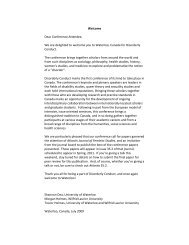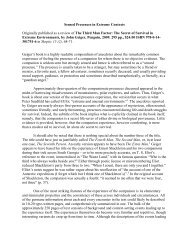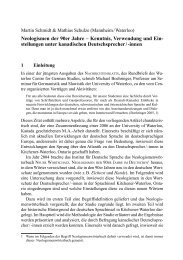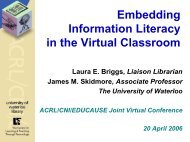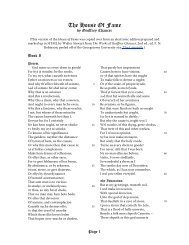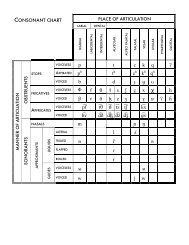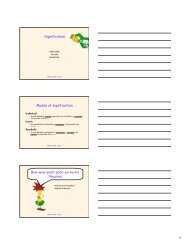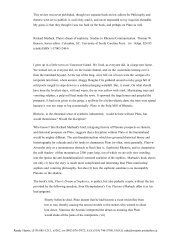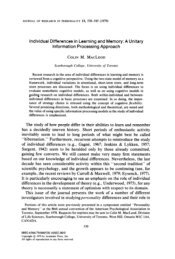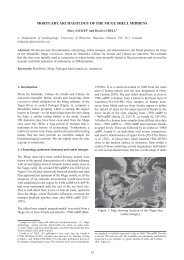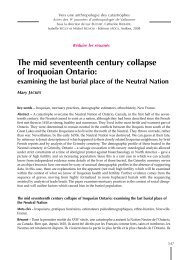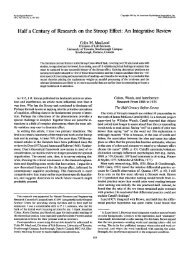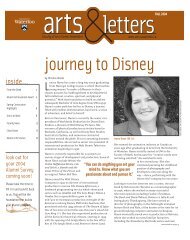German Diasporic Experiences. Identity, Migration, and Loss
German Diasporic Experiences. Identity, Migration, and Loss
German Diasporic Experiences. Identity, Migration, and Loss
You also want an ePaper? Increase the reach of your titles
YUMPU automatically turns print PDFs into web optimized ePapers that Google loves.
Table of Contents<br />
Hugo Hamilton: Preface: The Speckled People<br />
Mathias Schulze <strong>and</strong> James M. Skidmore: Diaspora <strong>Experiences</strong>: <strong>German</strong><br />
Immigrants <strong>and</strong> Their Descendants<br />
PART I: IDENTITY<br />
Janet M. Fuller: Language <strong>and</strong> <strong>Identity</strong> in the <strong>German</strong> Diaspora<br />
Patrick Stevenson <strong>and</strong> Jenny Carl: Language <strong>and</strong> the Negotiation of Identities<br />
among <strong>German</strong>-speaking <strong>Diasporic</strong> Communities in Central Europe<br />
Doris Schüpbach: <strong>German</strong>-speaking Swiss in Australia: Typical Swiss, Model<br />
Immigrants or a 'Sonderfall' Abroad?<br />
S<strong>and</strong>ra Kipp: <strong>Migration</strong>, Language Use <strong>and</strong> <strong>Identity</strong>: <strong>German</strong> in Melbourne,<br />
Australia, since the World War II<br />
Rolf Annas: Language <strong>and</strong> <strong>Identity</strong>: The <strong>German</strong>-speaking People of Paarl<br />
Grit Liebscher <strong>and</strong> Jennifer Dailey-O’Cain: Canadian <strong>German</strong>: <strong>Identity</strong> in<br />
Language<br />
Andrea Strutz: 'Memories from Afar.' Aspects of Memories Spanning Several<br />
Generations in Families of Austrian Jewish Refugees<br />
Jason Todd Baker: Pulitzer, Preetorius, <strong>and</strong> the <strong>German</strong>-American <strong>Identity</strong><br />
Project of the Westliche Post in Saint Louis<br />
Anne Löchte: “We dont want Kiser to rool in Ontario.” Franco-Prussian War,<br />
<strong>German</strong> Unification <strong>and</strong> World War I as Reflected in the Canadian<br />
Berliner Journal (1859-1918)<br />
James Casteel: The Politics of Diaspora: Russian <strong>German</strong> Émigré Activists in<br />
Interwar <strong>German</strong>y<br />
Christiane Harzig: Creating Transcultural Space: Ethnicity, Gender <strong>and</strong> the Arts<br />
in Chicago, 1890s to 1950s<br />
Manuel Meune: The GDR <strong>and</strong> the 'Citizens of <strong>German</strong> Origin' in Canada: The<br />
Role of the Gesellschaft Neue Heimat (1980-1990)
PART II: MIGRATION<br />
James M. Skidmore: Moving beyond Hyphenated <strong>German</strong> Culture: Establishing<br />
a Research Agenda for Expatriate <strong>and</strong> Heritage <strong>German</strong> Literary<br />
Studies<br />
Gisela Holfter: Some Facts <strong>and</strong> Figures on <strong>German</strong>-Speaking Exiles in Irel<strong>and</strong><br />
1933-45<br />
Nora Faires: Conversion as a "Two-Edged Sword": Evangelicalism among<br />
Pittsburgh's <strong>German</strong> Immigrants<br />
Angelika Sauer: The <strong>Diasporic</strong> Moment: Elise von Koerber, Dr. Otto Hahn, <strong>and</strong><br />
the Attempt to Create a <strong>German</strong> Diaspora in Canada<br />
Johannes-Dieter Steinert <strong>and</strong> Inge Weber-New: <strong>German</strong> Migrants in Post-War<br />
Britain: Immigration Policy, Recruitment <strong>and</strong> Reception<br />
Christin Pschichholz: Immigration of <strong>German</strong>-Speaking People to the Territory of<br />
Modern-Day Turkey (1850- 1918)<br />
Patrick Farges: Associating or Quarrelling? <strong>Migration</strong>, Acculturation <strong>and</strong><br />
Transmission among Social-Democratic Sudeten-<strong>German</strong>s in Canada<br />
Pascal Maeder: Sudeten-<strong>German</strong> Refugees in Canada <strong>and</strong> the Forced <strong>Migration</strong> of<br />
<strong>German</strong>s in Post-War Central <strong>and</strong> Eastern Europe<br />
Anne Ribbert: Language Attrition among <strong>German</strong>s Living in the Netherl<strong>and</strong>s<br />
Carsten Würmann: Der Onkel aus Amerika - The <strong>German</strong> Emigrant as Figure of<br />
Speech <strong>and</strong> Fictional Character<br />
Hanno Sowade: Ich will nach Amerika, mir eine neue Heimat suchen The<br />
Emigration of Expellees in post-1945 West <strong>German</strong> Film<br />
Christian Lieb: <strong>German</strong> Diaspora <strong>Experiences</strong> in British Columbia after 1945<br />
Stefan Engelberg: The <strong>German</strong> Language in the South Seas: Language Contact<br />
<strong>and</strong> the Influence of Language Politics <strong>and</strong> Language Attitudes<br />
Brigitte Bönisch-Brednich: <strong>Migration</strong>, Gender <strong>and</strong> Storytelling: How Gender<br />
Shapes the <strong>Experiences</strong> <strong>and</strong> the Narrative Patterns in Biographical<br />
Interviews
Karin Bauer: The Domestication of Radical Ideas <strong>and</strong> Colonial Spaces: The Case<br />
of Elisabeth Förster-Nietzsche<br />
PART III: LOSS<br />
Hans Lemberg: Reasons <strong>and</strong> Conditions of Population Transfer: Expulsion of<br />
<strong>German</strong>s from East <strong>and</strong> Central Europe <strong>and</strong> their Integration in<br />
<strong>German</strong>y <strong>and</strong> Foreign Countries after World War II.<br />
Benno Nietzel: Emigration <strong>and</strong> Wiedergutmachung: The Social History of<br />
Jewish Entrepreneurs from Frankfurt 1933-63<br />
Dieter Buse: Dissolving the <strong>German</strong> Diaspora in Pol<strong>and</strong>-A Different Approach<br />
J. Otto Pohl: Suffering in a Province of Asia: The Russian-<strong>German</strong> Diaspora in<br />
Kazakhstan<br />
Méri Frotscher Kramer: The Nationalization Campaign <strong>and</strong> the Rewriting of<br />
History-The Case of Blumenau, South Brazil<br />
Jörg Meindl: Pennsylvania <strong>German</strong> in Kansas: Language Change or <strong>Loss</strong>?<br />
Monique Laney: Wernher von Braun <strong>and</strong> Arthur Rudolph: Negotiating the Past<br />
in Huntsville, Alabama<br />
Doris Wolf: Brave or Naïve? Memory Work <strong>and</strong> Vergangenheitsbewältigung in<br />
Gertrud Mackprang Baer's In the Shadow of Silence<br />
Alex<strong>and</strong>er Freund: A <strong>German</strong> Post-1945 Diaspora? <strong>German</strong> Migrants' Encounters<br />
with the Nazi Past<br />
Natasha G. Wiebe: Di Br<strong>and</strong>t's Writing Breaks Canadian Mennonite Silence <strong>and</strong><br />
Reshapes Cultural <strong>Identity</strong><br />
Monika S. Schmid: Use It or Lose It? Language Use, Language Attitudes, <strong>and</strong><br />
Language Proficiency among <strong>German</strong> Speakers in Vancouver
Diaspora <strong>Experiences</strong>: <strong>German</strong> Immigrants <strong>and</strong> Their<br />
Descendants<br />
Mathias Schulze <strong>and</strong> James M. Skidmore<br />
University of Waterloo, Canada<br />
‘Diaspora <strong>Experiences</strong>: <strong>German</strong> Immigrants <strong>and</strong> Their<br />
Descendants’ was the title of a conference organized by<br />
the Waterloo Centre for <strong>German</strong> Studies in 2006. On<br />
August 24-27, about two hundred participants—<br />
researchers in history, literature <strong>and</strong> film, <strong>and</strong> linguistics<br />
as well as members of the interested public—discussed<br />
characteristics of Austrian, <strong>German</strong>, <strong>and</strong> Swiss identity in<br />
minority settings, aspects of the migration of <strong>German</strong><br />
speakers from central Europe to many different countries<br />
of the world, <strong>and</strong> also painful experiences such as the loss<br />
of Heimat or one’s native language.<br />
When planning the conference, 1 we knew we wanted to facilitate interdisciplinary<br />
discussion of the complex issues, perspectives, <strong>and</strong> aspects of <strong>German</strong> minorities<br />
worldwide under a broad thematic umbrella. Relatively early on <strong>and</strong> with some<br />
hesitation, we decided on the centrality of the notion of ‘diaspora’ for this<br />
conference. The concept of ‘diaspora’, applied to the <strong>German</strong> context of at least<br />
the last two centuries, is, of course, not unproblematic. In parts this is due to<br />
problems with applying the distinct concept of diaspora to a variety of contexts in<br />
migration studies, but more importantly, problems stemming from the semantic,<br />
historical, political, <strong>and</strong> moral tensions between the adjective ‘<strong>German</strong>’ <strong>and</strong> the<br />
noun ‘diaspora’. We therefore decided to ‘open up’ the word diaspora <strong>and</strong> return<br />
to its etymological roots—its Old Greek meaning of scattering, first of seeds <strong>and</strong><br />
later of people—without ignoring its later application in Jewish <strong>and</strong> postcolonial<br />
1<br />
For information follow the links on the website of the Waterloo Centre for <strong>German</strong> Studies<br />
http://www.wcgs.ca/.
contexts. This led to interesting <strong>and</strong> stimulating discussions during <strong>and</strong> after the<br />
conference presentations.<br />
Of course, ours was not the first conference which facilitated an academic dialog<br />
on <strong>German</strong> minorities. A number of recent conferences <strong>and</strong> publications have<br />
concentrated on <strong>German</strong>s in Canada. For instance, the conference Assimilation—<br />
Integration—Acculturation? The <strong>German</strong>-Canadian Case in 2004—organized by<br />
the chair in <strong>German</strong>-Canadian Studies, Alex<strong>and</strong>er Freund, at the University of<br />
Winnipeg—brought together scholars from history, linguistics <strong>and</strong> literature. With<br />
a wide underst<strong>and</strong>ing of migration <strong>and</strong> post-migration experiences, the focus of<br />
this conference was clearly on <strong>German</strong>-Canadians. Similarly, in their volume A<br />
Chorus of Different Voices, editors Angelika E. Sauer <strong>and</strong> Matthias Zimmer<br />
collected the contributions of participants to a 1996 workshop on <strong>German</strong>-<br />
Canadian identity. The volume sought to problematize “the notion of <strong>German</strong><br />
Canadians” (ix); as they note in their preface, “<strong>German</strong> Canadians defy<br />
definition” (ix). The contributors to the workshop <strong>and</strong> volume were for the most<br />
part historians who attempted to approach the topic of <strong>German</strong>-Canadian culture<br />
from fresh disciplinary perspectives. The volume’s explicit challenge to reflect on<br />
<strong>and</strong> reconsider the practice of studying the <strong>German</strong> diaspora in Canada—its<br />
problematization of <strong>German</strong>-Canadian studies, in other words—sounded a clear<br />
warning to scholars that traditional approaches to the <strong>German</strong> diaspora in Canada<br />
would no longer suffice. A Chorus of Different Voices dealt specifically with<br />
<strong>German</strong>-Canadians, <strong>and</strong> largely from a historiographical perspective, but its<br />
quarrel with established modes of underst<strong>and</strong>ing <strong>German</strong> diasporic identity was<br />
part of a larger shift in the scholarship of identity <strong>and</strong> culture. This swing towards<br />
a more probing scholarly discourse is seen in the collection of essays Theorizing<br />
Diaspora edited by Jana Evans Braziel <strong>and</strong> Anita Mannur in 2003. An anthology<br />
of earlier <strong>and</strong> more contemporary texts, the volume’s interdisciplinary <strong>and</strong><br />
eclectic range covers a breadth of issues both theoretical <strong>and</strong> related to specific<br />
diasporas. One of the collection’s most useful contributions with respect to this<br />
volume on the <strong>German</strong> diaspora is to enshrine a very liberal view of the term
‘diaspora’ itself with some of the essays discussing diasporas as diverse as<br />
Jewish, Asian-American, Afro-Caribbean, <strong>and</strong> gay Filipino. One of the highlights<br />
of the volume, a reprinting of Stuart Hall’s important essay “Cultural <strong>Identity</strong> <strong>and</strong><br />
Diaspora,” reminds the reader of the fact that cultural identity undergoes constant<br />
negotiation <strong>and</strong> renegotiation, a finding that can be easily seconded by much of<br />
the research in the present volume. Though one might fault Theorizing Diaspora<br />
for its lack of disciplinary or content focus—issues of language remain largely<br />
unexplored, for example—the theoretical impulses contained in the collection will<br />
play a large role in future research.<br />
Issues of language <strong>and</strong> society have also been discussed elsewhere. <strong>German</strong><br />
language isl<strong>and</strong>s in Europe <strong>and</strong> North America are examined in<br />
Sprachinselwelten, edited by Nina Berend <strong>and</strong> Elisabeth Knipf Komlósi in in<br />
2006. The contributions of this book—based on a section meeting of the<br />
International Society for <strong>German</strong> Dialectology—concentrate on linguistic features<br />
of selected varieties spoken outside of the <strong>German</strong>-speaking areas in central<br />
Europe. With an exclusively European focus, but a wider consideration of<br />
sociolinguistic issues, the volume National Varieties of <strong>German</strong> outside<br />
<strong>German</strong>y: A European Perspective, edited by Gabriele Hogan-Brun, examines<br />
varieties of <strong>German</strong> after the socio-political transformations in central <strong>and</strong> eastern<br />
Europe. Of course, issues of minority languages, language contact <strong>and</strong> change,<br />
societal <strong>and</strong> individual bilingualism—to name but a few—have been discussed in<br />
relation to the <strong>German</strong> language <strong>and</strong> many others. The same could be said about<br />
(<strong>German</strong>) literature in minority settings (see Skidmore, this volume). It has been<br />
described, analysed, <strong>and</strong> interpreted under headings such as migrant literature,<br />
expatriate literature, <strong>and</strong> Exilliteratur. However, hardly ever have essays in<br />
linguistics <strong>and</strong> literature of <strong>German</strong> minorities appeared together <strong>and</strong> alongside<br />
essays on history, migration, <strong>and</strong> diaspora studies. The small conference<br />
Assimilation—Integration—Acculturation? The <strong>German</strong>-Canadian Case is a<br />
notable exception here.
<strong>German</strong> <strong>Diasporic</strong> <strong>Experiences</strong> breaks new ground by presenting in one volume<br />
linguistic, historical, literary, <strong>and</strong> cinematic scholarship on similar, overlapping,<br />
complementary, <strong>and</strong> sometimes contrasting aspects of <strong>German</strong> minorities<br />
worldwide. A representative selection of edited papers from this conference, as<br />
well as the keynote addresses, follow in this volume, divided into three main<br />
parts: identity, migration, <strong>and</strong> loss.<br />
<strong>Identity</strong><br />
Keynote speaker Janet Fuller begins the first part with her discussion of identity<br />
in <strong>and</strong> through language. Her focus is on <strong>German</strong> speakers—particularly<br />
Pennsylvania <strong>German</strong>—in the United States. Patrick Stevenson <strong>and</strong> Jenny Carl<br />
continue the discussion of language <strong>and</strong> the negotiation of identities, but focus on<br />
<strong>German</strong>-speaking communities in central Europe, e.g., Hungary <strong>and</strong> the Czech<br />
Republic. Doris Schüpbach discusses how immigrants to Australia from <strong>German</strong>speaking<br />
Switzerl<strong>and</strong> relate their migratory experience of building a new life in a<br />
different language. Staying with the Australian context, S<strong>and</strong>ra Kipp gives an<br />
overview of <strong>German</strong> <strong>and</strong> <strong>German</strong> speakers in Australia between 1939 <strong>and</strong> 2001.<br />
A similar overview—with a focus on identity <strong>and</strong> identity construction—is<br />
provided by Rolf Annas who discusses the <strong>German</strong>-speaking people of Paarl in<br />
South Africa. In the first essay on <strong>German</strong>s in Canada, Grit Liebscher <strong>and</strong><br />
Jennifer Dailey-O’Cain show how these speakers position themselves in <strong>German</strong><br />
conversations.<br />
Of course the identity of immigrants <strong>and</strong> their descendants is not just constructed<br />
in language use. Andrea Strutz, for example, explores the memories Austrian-<br />
Jewish refugees maintained over several generations in the United States. The<br />
identity of well-known <strong>German</strong>-American journalists <strong>and</strong> newspaper editors,<br />
Pulitzer <strong>and</strong> Preetorius, is Jason T. Baker’s focus. Anne Löchte looks at the<br />
Berliner Journal (1859-1918) <strong>and</strong> asks what this Canadian <strong>German</strong>-language<br />
newspaper can tell us of the identity of its journalists <strong>and</strong> readership. Similarly
influenced by ‘external’ political events are the Russian <strong>German</strong> émigré activists<br />
during the interwar period in <strong>German</strong>y, whom James Casteel discusses in the next<br />
essay. Christiane Harzig, on the other h<strong>and</strong>, is more interested in transcultural<br />
spaces when looking at how <strong>German</strong>-American women in Chicago between 1889<br />
<strong>and</strong> 1950 constructed their (cultural) identity. The last chapter of the first part<br />
looks at more recent historical events <strong>and</strong> how they affected the relationship of<br />
East <strong>German</strong> institutions with Canadians <strong>and</strong> <strong>German</strong>-Canadians. Here, Manuel<br />
Meune investigates the role of the Gesellschaft Neue Heimat (1980-1990) <strong>and</strong> its<br />
representation of official East <strong>German</strong> identity in Canada.<br />
<strong>Migration</strong><br />
Part II—<strong>Migration</strong>—encompasses a broad spectrum of subthemes, all of which<br />
have in common a focus on moving: migration from one country to another, the<br />
personal experience of changing places, as well as the metaphor of moving on,<br />
making progress in a particular area. It is the latter perspective James M.<br />
Skidmore takes when he argues for moving the study of expatriate <strong>German</strong><br />
literature into the academic mainstream of <strong>German</strong> Literary Studies. Gisela<br />
Holfter takes a very different approach, providing an overview of <strong>German</strong><br />
migration to Irel<strong>and</strong> at the time of the Third Reich. Looking back further, Nora<br />
Faires analyses evangelicalism among Pittsburgh’s <strong>German</strong> newly arrived<br />
immigrants in the nineteenth century. Often <strong>German</strong> <strong>and</strong> other immigrants were<br />
recruited first in their homel<strong>and</strong> by so-called immigration agents. Angelika Sauer<br />
looks at the attempt by three such agents to create a <strong>German</strong> diaspora in<br />
nineteenth-century Canada. By the twentieth century many countries had<br />
developed a set of immigration <strong>and</strong> recruitment policies. Johannes-Dieter Steinert<br />
<strong>and</strong> Inge Weber-New look at these in the British context <strong>and</strong> pay particular<br />
attention to the reception of <strong>German</strong> migrants. Another focus on migration is<br />
offered by Christin Pschichholz when she discusses the immigration of <strong>German</strong>speaking<br />
people to the territory of modern-day Turkey (1850-1918). The<br />
subsequent two chapters by Patrick Farges <strong>and</strong> Pascal Maeder both talk about<br />
Sudeten-<strong>German</strong>s in Canada <strong>and</strong> their migration <strong>and</strong> acculturation. Anne Ribbert,
when looking at <strong>German</strong> speakers in the Netherl<strong>and</strong>s, shows that migration<br />
experiences can affect language use <strong>and</strong> competence. The next two essays both<br />
deal with the depiction of emigration in <strong>German</strong> film. Carsten Würmann looks at<br />
the fictional figure of the ‘Onkel aus Amerika’ <strong>and</strong> Hanno Sowade describes the<br />
depiction of expellees in post-1945 West <strong>German</strong> film. A number of Christian<br />
Lieb’s interviewees—<strong>German</strong>-speaking immigrants who came to British<br />
Columbia, Canada after 1945—have a lot in common with some of the fictional<br />
characters in these two films.<br />
Numerous chapters concentrate on <strong>German</strong>-speaking migrants to continents other<br />
than North America. Stefan Engelberg discusses <strong>German</strong> language politics of the<br />
colonial powers <strong>and</strong> attitudes towards <strong>German</strong> <strong>and</strong> the other languages spoken in<br />
the South Seas in the early twentieth century. Brigitte Bönisch-Brednich focuses<br />
on migration experiences of immigrants to New Zeal<strong>and</strong> <strong>and</strong> highlights gender<br />
differences. Similarly, Karin Bauer looks at the role of Elisabeth Förster-<br />
Nietzsche in building a <strong>German</strong> colony in South America.<br />
<strong>Loss</strong><br />
The third part is introduced by Hans Lemberg. He provides an historical overview<br />
of the expulsion of <strong>German</strong>s from east <strong>and</strong> central Europe after World War II.<br />
Shifting the focus to the flight <strong>and</strong> expulsion of Jewish entrepreneurs from<br />
Frankfurt during the Third Reich, Benno Nietzel discusses the concept <strong>and</strong><br />
realities of Wiedergutmachung in the post-war years. Dieter Buse directs the<br />
reader’s attention to the dissolution of a <strong>German</strong> minority in Pol<strong>and</strong>. The<br />
Russian-<strong>German</strong> diaspora in Kazakhstan—their forced migration <strong>and</strong> suffering—<br />
is the centre of attention in J. Otto Pohl’s essay. Similarly, the fate of a <strong>German</strong>speaking<br />
minority—the case of Blumenau in South Brazil—at the mercy of<br />
national politics is what interests Méri Frotscher Kramer. However, not every loss<br />
has primarily a political or ideological cause. Jörg Meindl, for example, ponders<br />
the question whether or not the changes in Pennsylvania <strong>German</strong> in Kansas can be<br />
described as language loss. The ostensible loss of ‘memory’ is what Monique
Laney investigates in her essay on Wernher von Braun <strong>and</strong> Arthur Rudolph. In<br />
her literary analysis <strong>and</strong> interpretation, Doris Wolf employs a similar approach to<br />
memory <strong>and</strong> Vergangenheitsbewältigung when she approaches Gertrud<br />
Mackprang Baer’s personal narrative In the Shadow of Silence. Alex<strong>and</strong>er Freund<br />
also looks at Vergangenheitsbewältigung, in his case by <strong>German</strong> migrants in<br />
Canada. The last two chapters of this collection deal with different kinds of loss.<br />
Natasha G. Wiebe interprets the loss of ‘community’ <strong>and</strong> the changing cultural<br />
identity as depicted in the works of the Mennonite writer Di Br<strong>and</strong>t <strong>and</strong> Monika<br />
S. Schmid analyses aspects of <strong>and</strong> contributors to the loss of <strong>German</strong> by speakers<br />
in Vancouver.<br />
In its thirty-eight chapters, this book provides a complex album of cultural,<br />
historical, <strong>and</strong> linguistic perspectives on many different aspects of <strong>German</strong>speaking<br />
minorities on five continents—a collection that highlights the many<br />
different facets of current thinking on <strong>and</strong> knowledge of these minorities all over<br />
the globe.<br />
We would like to thank the authors for their insightful contributions to this book <strong>and</strong> for the very<br />
pleasant collaboration over the course of about two years. The editors of this book benefitted<br />
greatly from help by Janet Vaughan at the University of Waterloo <strong>and</strong> from the support of the<br />
colleagues at Wilfrid Laurier University Press. Moreover, the conference on which the volume is<br />
based would not have been possible without the assistance of graduate students—here we would<br />
like to mention Peter Wood, Janice MacGregor, <strong>and</strong> Agata Monkiewicz in particular—as well as<br />
the immense work by staff at both St. Paul’s College at the University of Waterloo, especially<br />
Jodie Fitzgerald. Finally, all of us involved wish to express our appreciation to the conference’s<br />
sponsors, the Social Sciences <strong>and</strong> Humanities Research Council of Canada, Eddie Koch, the<br />
Waterloo Centre for <strong>German</strong> Studies, the University of Waterloo, the Goethe Institute (Toronto),<br />
the <strong>German</strong>-Canadian Chamber of Industry <strong>and</strong> Commerce (Toronto), the <strong>German</strong>-Canadian<br />
Congress (Ontario), the <strong>German</strong>y Embassy (Ottawa), the Consulate General of <strong>German</strong>y<br />
(Toronto), the Consulate General of Switzerl<strong>and</strong> (Toronto), the Austrian Embassy (Ottawa), <strong>and</strong><br />
Marga Weigel. Thank you all.<br />
Waterloo, Ontario
December 2007<br />
Works Cited<br />
Berend, Nina, Elisabeth Knipf-Komlósi, William D. Keel, <strong>and</strong> Internationale<br />
Gesellschaft für Dialektologie des Deutschen. Kongress.<br />
Sprachinselwelten : Entwicklung Und Beschreibung Der Deutschen<br />
Sprachinseln Am Anfang Des 21. Jahrhunderts = the World of Language<br />
Isl<strong>and</strong>s : The Developmental Stages <strong>and</strong> the Description of <strong>German</strong><br />
Language Isl<strong>and</strong>s at the Beginning of the 21st Century, Variolingua,.<br />
Frankfurt am Main ; New York: Lang, 2006.<br />
Braziel, Jana Evans, <strong>and</strong> Anita Mannur. Theorizing Diaspora : A Reader,<br />
Keyworks in Cultural Studies. Malden, MA: Blackwell Pub., 2003.<br />
Freund, Alex<strong>and</strong>er, ed. Assimilation—Integration—Acculturation? The <strong>German</strong>-<br />
Canadian Case. Toronto: University of Toronto Press, forthcoming.<br />
Hogan-Brun, Gabrielle. National Varieties of <strong>German</strong> Outside <strong>German</strong>y, <strong>German</strong><br />
Linguistic <strong>and</strong> Cultural Studies,. Oxford ; New York: P. Lang, 2000.<br />
Sauer, Angelika E., <strong>and</strong> Matthias Zimmer, eds. A Chorus of Different Voices.<br />
<strong>German</strong>-Canadian Identities. New York: Peter Lang, 1998.



